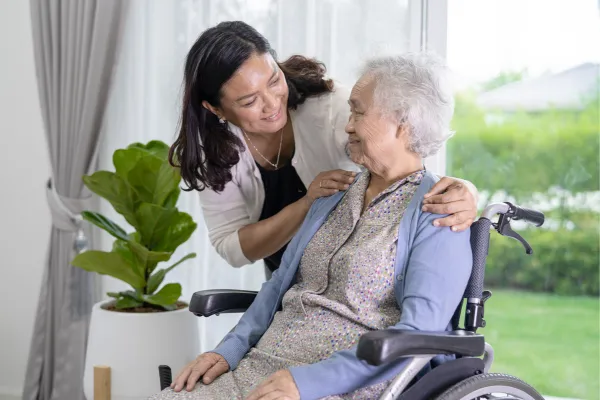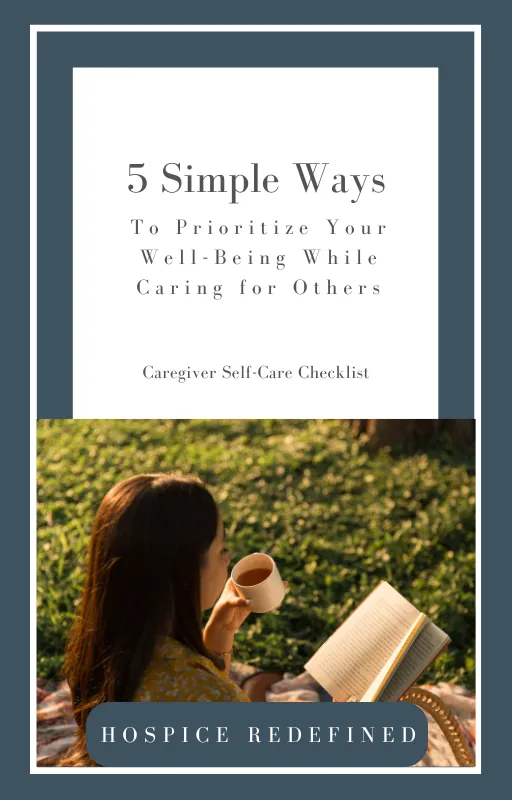
Redefined
Hospice
Your Guide to Understanding Hospice With Clarity and Compassion

Hospice
Redefined
Your Guide to Understanding Hospice With Clarity and Compassion

Navigating the Emotional Rollercoaster of Caregiving
“Caregiving is undeniably hard, but it’s also a profound act of love. It brings challenges, yes, but it also brings beautiful moments of connection." - Rachel Carta, RN
Navigating the Emotional Rollercoaster of Caregiving:
Finding Support and Strength
Caring for a loved one can be one of the most emotionally challenging experiences a person can face. Whether it's a family member or a friend, the role of a caregiver requires immense emotional, physical, and mental strength. But there’s more to caregiving than just providing physical assistance—it’s about navigating the emotional rollercoaster that can come with the experience.
At Hospice Redefined, we aim to shift the narrative around hospice care by offering valuable insights, practical tools, and compassionate support to those in this demanding role. Today, we’ll explore the complex emotional journey that caregivers often experience, and why finding support is vital to sustaining the strength needed during this time.

The Four Kinds of People
In the world of caregiving, there are four kinds of people: those who have been caregivers, those who are currently caregivers, those who will be caregivers, and those who will need a caregiver. This perspective is important because it reminds us that caregiving is a universal experience—one that everyone can relate to in some way.
At some point, you may find yourself stepping into the role of a caregiver, or perhaps you already have, and understanding the emotional toll it takes can help us provide better support to those who need it.
The Grief That Comes with Caregiving
Caregiving is often accompanied by grief, even before the loss of a loved one. This grief manifests in various ways—loss of the person they once were, loss of the connection once shared, and the impending sense of an irreversible change.
Caregivers may find themselves in the early stages of grief, experiencing emotions such as denial or anger, while simultaneously shouldering the enormous tasks of caregiving. This emotional complexity is something many don’t fully realize until they are in the midst of it.
For those who have been caregiving for years, the grief can become even more profound. They witness the slow decline of their loved one and must cope with the emotional toll of not only seeing their loved one change but also of managing their own feelings of loss. It’s a heavy emotional burden that many caregivers bear in silence, but it’s important to acknowledge that grief is a part of the caregiving process.
The Rollercoaster of Emotions
One of the most challenging aspects of caregiving is the emotional rollercoaster that comes with it. Caregivers often experience intense emotional swings, from moments of deep sadness to feelings of guilt, joy, and even frustration, all in the span of a day.
There may be moments when caregivers feel overwhelmed by the weight of the task at hand, but then, in the blink of an eye, they are met with a moment of joy, like a smile or a word from their loved one that provides a glimpse of the person they once were.
This emotional volatility takes a toll on caregivers, both physically and mentally. The constant up and down, the unpredictability of emotions, can leave them feeling drained. It’s essential to recognize that these emotional swings are a normal part of the process—though they can feel exhausting, they don’t define the entire experience of caregiving.
The Importance of Support
When navigating this emotional rollercoaster, it’s crucial to have a strong support system. No one can do this alone. Having people to lean on—whether it’s family, friends, healthcare professionals, or support groups—can make all the difference in helping caregivers manage the emotional stress they’re under.
Caregivers often feel the strain of not being appreciated, whether by the patient they are caring for or by other family members. This lack of recognition can lead to feelings of frustration and resentment, especially when the caregiver is giving their all to provide care. However, it’s important to understand that these emotions are common, and they are not a reflection of personal failure. The reality is that caregiving is an exhausting, often thankless role, and it’s natural to feel overwhelmed at times.
Practical Tips for Managing the Emotional Rollercoaster
How can caregivers manage this emotional rollercoaster in a healthy way?
The first step is to feel the emotions as they arise. Although this may seem simple, it’s one of the hardest things for many caregivers to do. Suppressing emotions can lead to long-term stress and burnout. Instead, caregivers are encouraged to allow themselves to feel whatever emotions come up, whether it’s sadness, anger, or guilt. Taking a moment to breathe and let the feelings move through can be a powerful tool for emotional relief.
Support is another crucial element in managing the emotional stress of caregiving. Caregivers who feel isolated or alone often experience a negative spiral of self-doubt and worry. Being able to talk to someone—whether it’s a family member, a friend, or a healthcare provider—can provide much-needed relief and perspective.
Additionally, self-care is an essential component of managing the emotional toll of caregiving. Caregivers often neglect their own well-being in favor of attending to the needs of their loved ones. However, self-care isn’t a luxury—it’s a necessity. Taking small steps to ensure physical and emotional health, like getting enough sleep, eating nourishing foods, and staying hydrated, can make a significant difference in how well caregivers are able to cope with the demands of their role.
Finding Balance Through Self-Care
The phrase “put on your own oxygen mask first” is a common reminder to caregivers that they must prioritize their own health and well-being. While it’s easy to get caught up in the day-to-day tasks of caregiving, it’s important to remember that you cannot pour from an empty cup. Self-care doesn’t need to be elaborate; simple, sustainable habits—like getting rest, drinking enough water, and eating balanced meals—can help restore energy and emotional resilience.
In the upcoming episodes of Hospice Redefined, we’ll dive deeper into the holistic aspects of caregiving, such as the impact of nutrition, hydration, and sleep on emotional health. By addressing these foundational elements, caregivers can better manage the emotional stress that comes with their role.
Final Thoughts
Caregiving is undeniably hard, but it’s also a profound act of love. It brings challenges, yes, but it also brings beautiful moments of connection. It’s essential to remember that you are not alone in this journey. There are resources, support groups, and professionals available to help you navigate this complex emotional terrain.
Caregiving can feel isolating, but reaching out for support can make all the difference. If you’re in this role, or if you know someone who is, remember that it’s okay to ask for help, to feel your emotions, and to take time for self-care. You are doing important, meaningful work, and it’s essential to honor yourself through the process.
The Hospice Redefined podcast is here to answer your questions, dispel myths, and provide practical guidance for families facing hospice decisions. You can visit hospiceredefined.com to find resources, submit questions, and access the caregiver self-care checklist.
If you or a loved one are considering hospice care, know that you are not alone. The more we understand hospice, the more we can embrace its true purpose—supporting life, comfort, and connection in a time that matters most.
Written and produced by Rachel Carta, RN. This episode features an interview with John Myers, MSW.
Listen
Episode 1:
Episode Title Goes Here
Episode 2:
Episode Title Goes Here
Episode 3:
Episode Title Goes Here
YOUR WELL-BEING MATTERS TOO
5 Simple Ways to Prioritize Your Well-Being
While Caring for Others
Click below to get instant access to the Caregiver Self-Care Checklist.


Your Host
Rachel is a hospice nurse, functional nutrition counselor, and life coach. As host of Hospice Redefined, she’s passionate about dispelling hospice misconceptions and empowering caregivers with knowledge and support. Her mission is to help families see hospice as an opportunity for comfort, dignity, and meaningful connection.
Rachel Carta, RN
HOST OF HOSPICE REDEFINED, AUTHOR, SPEAKER
SELINSGROVE, PA

Special Recurring Contributor
John is a social worker with more than 30 years of experience. He brings a wealth of knowledge, compassion, and empathy to our listeners.
John Myers, MSW
SOCIAL WORKER







